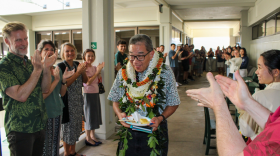For centuries, the Hawaiian language thrived in the islands as an oral language — where chant and song were used to record history and share stories over generations.
But once the language transitioned to written form following the arrival of American missionaries, it altered the future course of the Hawaiian language we commonly hear today.

Hawaiian immersion school teacher Kalaniakea Wilson remembers hearing a different kind of Hawaiian language from his grandmother Panana Pine. She would read the Hawaiian language bible, or Baibala Hemolele, every morning and every night before she went to bed.
"I heard these words, I heard these letters when I was small, but I didn’t really think anything of it," Wilson said. "Then becoming a Hawaiian immersion school teacher and not seeing those letters, I really still didn’t even think of it then like, 'Oh, why are these letters or why are these not letters?'”
The alphabet commonly used today in Hawaiian language education includes 12 letters: five vowels and seven consonants.
But the earliest printed version of a Hawaiian alphabet in 1822 reveals a system with 21 letters including five additional consonants: B, D, R, T and V.
"So I’m like, hey, I didn’t learn 'B' using the letter 'B' as a Hawaiian letter, spelling Hawaiian words, so I said eh, something is here, you know what I mean?" Wilson said.
Wilson has been researching the evolution of the Hawaiian language in the earliest days of its transition to written form.
He hopes to create a curriculum around what he calls Christian Hawaiian Language to recover these letters and words.
"I think what’s really important is how our culture and language and islands went through an evolution with the collision of foreigners coming here," Wilson said.
"Us changing religion, changing governments, the oppression of the educational system for over a century that spanked my grandparents, that kind of inspires me to do this. That’s why I’m doing this," he said.
Wilson drafted a resolution calling on the United Church of Christ to fund a Christian Hawaiian Language Revitalization Program.
The General Synod in Indianapolis approved the resolution in June.





